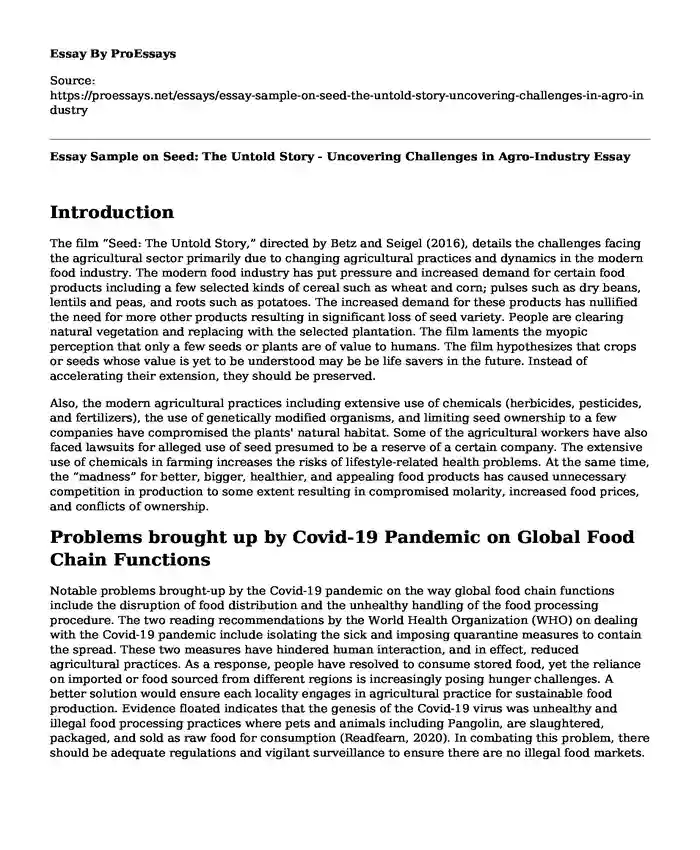Introduction
The film “Seed: The Untold Story,” directed by Betz and Seigel (2016), details the challenges facing the agricultural sector primarily due to changing agricultural practices and dynamics in the modern food industry. The modern food industry has put pressure and increased demand for certain food products including a few selected kinds of cereal such as wheat and corn; pulses such as dry beans, lentils and peas, and roots such as potatoes. The increased demand for these products has nullified the need for more other products resulting in significant loss of seed variety. People are clearing natural vegetation and replacing with the selected plantation. The film laments the myopic perception that only a few seeds or plants are of value to humans. The film hypothesizes that crops or seeds whose value is yet to be understood may be be life savers in the future. Instead of accelerating their extension, they should be preserved.
Also, the modern agricultural practices including extensive use of chemicals (herbicides, pesticides, and fertilizers), the use of genetically modified organisms, and limiting seed ownership to a few companies have compromised the plants' natural habitat. Some of the agricultural workers have also faced lawsuits for alleged use of seed presumed to be a reserve of a certain company. The extensive use of chemicals in farming increases the risks of lifestyle-related health problems. At the same time, the “madness” for better, bigger, healthier, and appealing food products has caused unnecessary competition in production to some extent resulting in compromised molarity, increased food prices, and conflicts of ownership.
Problems brought up by Covid-19 Pandemic on Global Food Chain Functions
Notable problems brought-up by the Covid-19 pandemic on the way global food chain functions include the disruption of food distribution and the unhealthy handling of the food processing procedure. The two reading recommendations by the World Health Organization (WHO) on dealing with the Covid-19 pandemic include isolating the sick and imposing quarantine measures to contain the spread. These two measures have hindered human interaction, and in effect, reduced agricultural practices. As a response, people have resolved to consume stored food, yet the reliance on imported or food sourced from different regions is increasingly posing hunger challenges. A better solution would ensure each locality engages in agricultural practice for sustainable food production. Evidence floated indicates that the genesis of the Covid-19 virus was unhealthy and illegal food processing practices where pets and animals including Pangolin, are slaughtered, packaged, and sold as raw food for consumption (Readfearn, 2020). In combating this problem, there should be adequate regulations and vigilant surveillance to ensure there are no illegal food markets.
Reference
Betz, J. & Siegel, T. (Directors). (2016). Seed: The untold story [Film]. Collective Eye.
Readfearn, G. (2020). How did coronavirus start and where did it come from? Was it really Wuhan’s animal market? The Guardian. Accessed 2020 July 01 from https://www.theguardian.com/world/2020/apr/28/how-did-the-coronavirus-start-where-did-it-come-from-how-did-it-spread-humans-was-it-really-bats-pangolins-Wuhan-animal-market
Cite this page
Essay Sample on Seed: The Untold Story - Uncovering Challenges in Agro-Industry. (2023, Sep 17). Retrieved from https://proessays.net/essays/essay-sample-on-seed-the-untold-story-uncovering-challenges-in-agro-industry
If you are the original author of this essay and no longer wish to have it published on the ProEssays website, please click below to request its removal:
- The Pop Culture and Futurama Essay
- The Seven Samurai (1954) Essay
- Essay Sample on Media Addiction: Causes, Dangers, Prevention & Intervention
- Essay Example on Pitch Quality: Finding the Right Pitch for Your Audience
- Doping Scandal Exposes Russia's State-Sponsored Olympic Program: Essay Sample on Icarus Documentary
- Essay on Social Media: The Modern Way of Sharing Content and Opinions
- Paper Example on Adaptations: A Comprehensive Anthology of Short Stories and Films







